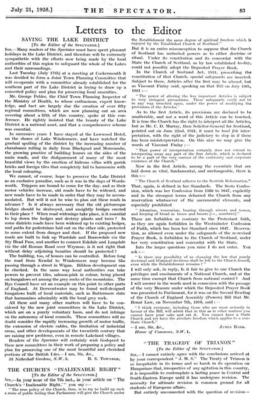Letters to the Editor
SAVING THE LAKE DISTRICT
[To the Editor of the SPECTATOR.] SIR,—Many readers of the Spectator must have spent pleasant holidays in the Lake District, and therefore will be extremely sympathetic with the efforts now being made by the local authorities of this region to safeguard the whole of the Lakes and their surroundings.
Last Tuesday (July 17th) at a meeting at Cockerel-Louth it was decided to form a Joint Town Planning Committee that will co-operate with a committee already established for the southern part of the Lake District in trying to draw up a concerted policy and plan for preserving local amenities.
Mr. George Pebler, the Chief Town Planning Inspector of the Ministry of Health, to whose enthusiasm, expert know- ledge, and tact are largely due the creation of over fifty regional committees, which are now planning out an area covering about a fifth of this country, spoke at this con- ference. He rightly insisted that the beauty of the Lake District is a national asset, and that a comprehensive scheme was essential.
In successive years I have stayed at the Lowwood Hotel, on the shores of Lake Windermere, and have watched the gradual spoiling of the district by the increasing number of charabancs rolling in daily from Blackpool and Morecambe, the growing practice of building houses on the sides of the main roads, and the disfigurement of many of the most beautiful views by the erection of hideous villas with garish bricks and foreign tiles that completely fail to harmonize with the local colouring.
We cannot, of course, hope to preserve the Lake District as an exclusive paradise, such as it was in the days of Words- worth. Trippers are bound to come for the day, and as their motor vehicles increase, old roads have to be widened, and new roads have to be made in order that they may be accom- modated. But will it not be wise to plan out these roads in advance ? Is it always necessary that the old picturesque bridges should be destroyed, and unsightly bridges erected in their place ? When road widenings take place, is it essential to lop down the hedges and destroy plants and trees ? In some districts roads have been widened up to existing hedges, and paths for pedestrians laid out on the other side, protected to some extent from danger and dust. If the proposed new roads are built to link up Wastdale and Borrowdale via the Sty Head Pass, and another to connect Eskdale and Langdale via the old Roman Road over Wrynose, is it not right that without delay adjoining beauties should be protected ?
The building, too, of houses can be controlled. Before long the road from Kendal to Windermere may become like passing through a street in Wigan. Ribbon, development can be checked. In the same way local authorities .can take powers to prevent tiles, salmon-pink in colour, being ,placed on bungalows set among the grey rocks of the mountains. The Rye Council have set an example on this point to other parts of England. At Derwentwater may be found well-designed bungalows built of local materials, such as Buttermere slate that harmonizes admirably with the local grey rock.
All these and many other matters will have to be con- sidered by the new joint committees in the Lake District, which are on a purely voluntary basis, and do not infringe on the autonomy of local councils. These committees will no doubt consider the rapidly increasing growth of motor traffic, the extension of electric cables, the limitation of industrial areas, and other developments of the twentieth century that are raising new problems, even in remote Lakeland villages.
Readers of the Spectator will certainly wish Godspeed to these new committees in their work of preparing a policy and plan for preserving one of the most beautiful and cherished portions of. the British Isles.—I am, Sir, &c.,
53 Netherhall Gardens, N.W. 3. B. S. TOWNROE.




















































 Previous page
Previous page